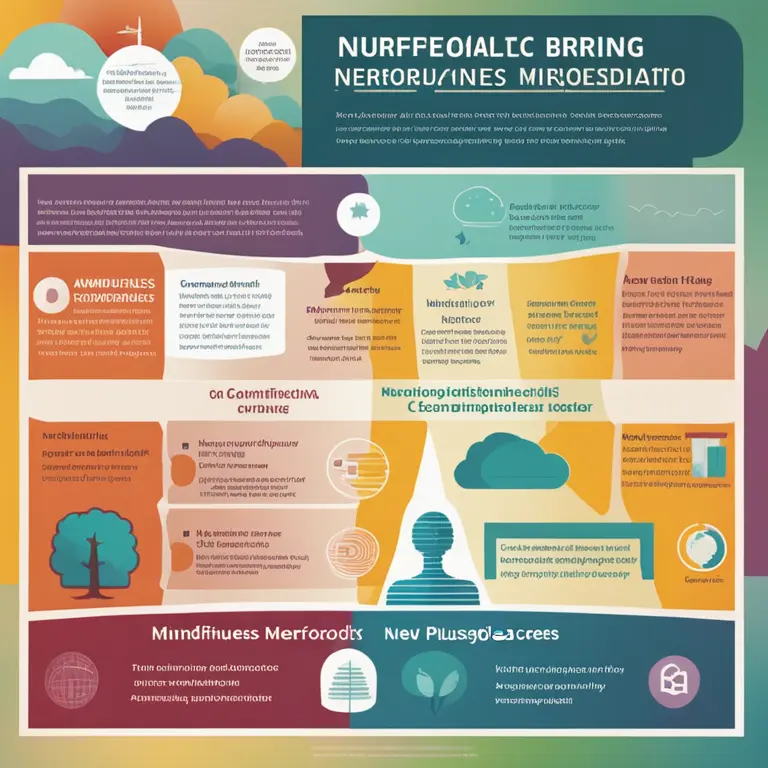
Mindfulness Meditation for Healing
Discover how mindfulness meditation can support recovery and healing. Embrace the tranquility and benefits of this ancient practice in your journey towards wellness.
article by Hina Kurosawa
Meditation and Recovery: An Introduction
In the contemporary sphere of wellness, mindfulness meditation has emerged as a beacon of respite and rehabilitation. As we venture into 2024, we discover an increasing body of research advocating the profound effects of mindfulness on physical and emotional recovery. This ancient practice, rooted in Buddhist traditions, has traversed cultural boundaries to become a universal tool in the healing arts. It offers those in recovery a path to self-discovery, mental clarity, and an anchor in the tumultuous seas of stress and anxiety. Here we delve into how mindfulness can serve as a powerful adjunct therapy for those seeking solace and strength in their recovery journey.

The Science Behind Mindfulness
The efficacy of mindfulness meditation is no longer just a subject of spiritual discourse but has garnered significant attention in scientific communities. A flurry of studies, specifically those harnessing neuroimaging technologies, have illuminated how this practice reshapes our brain's architecture. Neuroplasticity, the brain's ability to form new connections, plays a pivotal role in recovery. Mindfulness fosters this adaptive process, supporting the regeneration of areas impacted by stress. Amygdala shrinkage, a marker of reduced stress response, and the bolstering of the prefrontal cortex, associated with higher order thinking, epitomize the tangible neurobiological benefits that lay the groundwork for lasting recovery.

Integrating Mindfulness in Daily Routine
For many, the integration of mindfulness into everyday life poses a challenge amidst our frenetic modern existence. However, its integration is essential for those on the road to recovery. Reclaiming a sense of control and developing resilience through moments of focused presence can significantly mitigate the pressures of life post-trauma or addiction. Establishing a simple, daily practice — be it through guided sessions or independent meditation — encourages habitual self-regulation and the fostering of an inner sanctuary. As we adjust to the nuances of our evolving world, so too must our strategies for health and wellness adapt, making mindfulness an indispensable companion.

Obstacles and Triumphs in Mindful Practice
It is crucial to acknowledge the hurdles that individuals may encounter when embarking on a mindful meditation journey. Early stages of practice often bring about discomfort as one becomes acutely aware of the internal dialogue and patterns that dominate the mind. Moreover, misconceptions about the need for a completely silent mind can deter newcomers. Yet, true mindfulness lies in non-judgmental awareness. The triumph comes with persistence. Over time, the practitioner learns to observe thoughts and feelings without entanglement, creating space for healing and understanding, much-needed allies in the recovery process.
Expanding Beyond Personal Practice
As personal practice solidifies, many seek to expand the benefits of mindfulness beyond their individual experience. Mindfulness-based group therapy has gained traction, offering solidarity and shared growth. Communities, both in-person and online, provide invaluable platforms for exchange and support. Peer-led initiatives and professional guidance within such groups cultivate a collective resilience, forging a common path toward recovery. This collective aspect of mindfulness practice resonates with our intrinsic need for connection, ultimately enriching the individual's healing journey through the power of shared experiences.
Conclusion: Embracing Mindfulness to Cultivate Healing
The essence of mindfulness meditation in the context of recovery is its capacity to transform our relationship with our thoughts and emotions. Rather than being at the mercy of our internal narratives, we learn through mindfulness to become attentive observers. The stillness and acceptance cultivated within a mindfulness practice are not merely passive states but are active processes in healing and recovery. In embracing mindfulness meditation, individuals take a proactive stance in their healing, yielding inner harmony and fostering a profound sense of renewal.
Published: 1/18/2024
Modified: 1/18/2024
More predictions
Come back here soon to learn more about yourself and your future


The Connection Between Meditation & Mindfulness
Discover the relationship between meditation and mindfulness, and how these practices contribute to mental clarity and inner peace.


Mindfulness & Meditation: Enhancing Cognitive Flexibility
Discover how mindfulness meditation can foster cognitive flexibility, improving your ability to adapt to new situations and think creatively.


A Beginner's Guide to Mindful Meditation Explained
Discover the essentials of mindful meditation to start your journey towards inner peace and heightened awareness with this beginner-friendly guide.